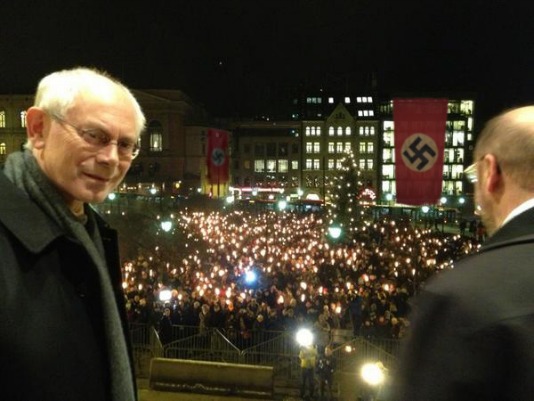ACHTUNG! CITEREN UIT DEZE TEKST VERBOTEN!
 Om moedeloos van te worden. Brussel, volledig dichtgetikt bastion van onzichtbare doch dwingende regelgeving, verbiedt discussie over Brussel. Althans, over concept ideetjes die nog geen werkelijkheid zijn maar wel bijna. Want de conclusies in die plannen zouden nog wel eens licht geretoucheerd kunnen worden op de aanstaande Eurotop. Maar vooral heeft Van Rompuy liever niet dat zijn federale
Om moedeloos van te worden. Brussel, volledig dichtgetikt bastion van onzichtbare doch dwingende regelgeving, verbiedt discussie over Brussel. Althans, over concept ideetjes die nog geen werkelijkheid zijn maar wel bijna. Want de conclusies in die plannen zouden nog wel eens licht geretoucheerd kunnen worden op de aanstaande Eurotop. Maar vooral heeft Van Rompuy liever niet dat zijn federale LIMITE EN COUNCIL OF THE EUROPEAN UNION
Brussels, 3 December 2012
15632/12 LIMITE CO EUR-PREP 43
NOTE
from: General Secretariat of the Council
to: Permanent Representatives Committee / Council
Subject: European Council (13-14 December 2012)
- Draft conclusions
In accordance with Article 2(3)(a) of the Council's Rules of Procedure, delegations will find attached the draft conclusions prepared by the President of the European Council, in close cooperation with the member of the European Council representing the Member State holding the six-monthly Presidency of the Council and with the President of the Commission.
I. ECONOMIC POLICY
Roadmap for the completion of EMU
1. In the light of the fundamental challenges facing it, the Economic and Monetary Union needs to be strengthened to ensure economic and social welfare as well as stability and sustained prosperity. Economic policies must be fully geared towards promoting strong and sustainable economic growth, enhancing competitiveness and boosting employment in order for Europe to remain a highly attractive social market economy and to preserve the European social model.
2. The consolidation of EMU rests not only on redefining its architecture but also on pursuing sound fiscal policies. In this respect, the possibilities offered by the EU's fiscal framework to balance productive public investment needs with fiscal discipline objectives must be fully exploited. The Commission is currently exploring further ways to accommodate public investment programmes in its assessment of Stability and Convergence Programmes and excessive deficit procedures.
3. Further to the interim report submitted in October 2012, the President of the European Council, in close collaboration with the Presidents of the European Commission, the European Central Bank and the Eurogroup, has elaborated a specific and time-bound road map for the achievement of genuine Economic and Monetary Union. The European Council also notes the "Blueprint" issued by the Commission which provides a comprehensive analysis of the relevant issues combined with an assessment of their legal aspects. The European Council sets out the next steps towards completing EMU in a staged process and covering all essential building blocks.
4. This process will build on the EU's institutional and legal framework, will be open and transparent towards Member States not using the single currency and will respect the integrity of the Single Market.
Stage 1 (2012-2013)
Ensuring fiscal sustainability and breaking the link between banks and sovereigns
5. In the short term, the priority is to complete and implement the framework for stronger economic governance, including the "Six-pack", the Treaty on Stability Coordination and Governance and the "Two-pack".
6. p.m. SSM, including EBA (text to be provided in the light of 4 December ECOFIN)
7. The European Council urges the legislators to agree on the proposals for a Recovery and Resolution Directive and for a Deposit Guarantee Scheme Directive by the end of March 2013.
8. p.m. CRR/CRD IV (text to be provided in the light of 4 December ECOFIN)
9. Further to the June 2012 euro area Summit statement and the October 2012 European Council conclusions, an operational framework should be agreed no later than March 2013, so that when an effective single supervisory mechanism is established, the European Stability Mechanism could, following a regular decision, have the possibility to recapitalise banks directly.
Stage 2 (2013-2014)
Completing the integrated financial framework and promoting growth and jobs at national level
10. In a context where bank supervision is effectively moved to a single supervisory mechanism, a common resolution authority, with the necessary powers to ensure that any bank in participating Member States can be resolved with the appropriate tools, will be required. Once the proposals for a Recovery and Resolution Directive and for a Deposit Guarantee Scheme Directive have been adopted, the Commission will then submit a proposal for a single resolution authority for Member States participating in the SSM in the course of 2013, to be examined by the legislators with a view to its adoption as a matter of priority. It should safeguard financial stability and ensure an effective framework to resolve financial institutions while protecting taxpayers in the context of banking crises. It should include appropriate and effective common backstop arrangements. This mechanism should be fully compatible with the Single Market, without prejudice to the rights of non-participating Member States.
11. The EU's economic surveillance framework should be further strengthened by allowing for greater ex ante coordination of Member States' major reform projects, as foreseen in the Treaty on Stability, Convergence and Governance and in the conclusions of the October 2012 European Council. The Commission will make to that end in 2013 a proposal for a framework for ex ante coordination of major structural reforms in the context of the European Semester.
12. All Member States need to promote strong and sustainable economic growth, competitiveness and employment. To achieve this objective, all Member States whose currency is the euro will enter into individual arrangements of a contractual nature with EU institutions on the measures and reforms they commit to undertake and on the means for their implementation. Such agreements should be consistent with, and support, the overall policy mix resulting from the Annual Growth Survey and should allow a dialogue on the basis of the country-specific recommendations. Non euro area Member States may choose to enter into similar arrangements. The European Council notes the Commission intention to make a proposal in 2013 on specific ways to put in place such contractual arrangements and on the means to support their implementation, building on existing EU procedures.
Stage 3 (post 2014)
Creating a common stabilisation function and further coordinating national economic policies
13. The general objective of the third stage will be to aim for a progressive pooling of economic sovereignty at the European level as well as a reinforced solidarity between Member States. This will take more time and may imply a change to the Treaties.
14. Building on the transition and convergence set in motion under the second stage, the third stage could include a mechanism providing a degree of automatic stabilisation at the European level. This would take the form of a well-defined and limited fiscal capacity to improve the absorption of large country-specific economic shocks through an insurance system at the central level. This would improve the resilience of the euro area as a whole and complement the contractual arrangements developed under the second stage. The European Council invites the Commission to further explore the feasibility and the operational features of such a fiscal capacity.
15. This stage would also build on an increasing degree of common decision-making on national budgets and an enhanced coordination of economic policies, in particular in the field of taxation and employment, building on the Member States' National Job Plans.
16. More generally, as the EMU evolves towards deeper integration, a number of other important issues will need to be further examined. In this respect, the work conducted to date by the President of the European Council together with the Presidents of the European Commission, the European Central Bank and the Eurogroup, as well as the Commission's "Blueprint", provide a useful basis for a debate on all these issues, which should be further explored.
17. The European Council will discuss these questions after the election of a new European Parliament and the appointment of a new Commission.
Democratic legitimacy and accountability
18. Throughout the process, the general objective remains to ensure democratic legitimacy and accountability at the level at which decisions are taken and implemented. Today, steps are already being taken to ensure the appropriate involvement of the European Parliament and of national parliaments in the EU's new economic governance, notably within the European Semester process of coordination of economic policies. Any new steps towards strengthening economic governance will need to accompanied by further steps towards stronger legitimacy and accountability.
19. At national level, the mobilisation of budgetary resources that this process implies will require the involvement of parliaments. Furthermore, the contractual arrangements can only be implemented if they enjoy domestic ownership and accountability.
20. Accountability at the European level will help ensure that the common European interest is taken into account. Further integration of policy making, including via the contractual arrangements, and greater pooling of competences at the EU level must be accompanied by a commensurate involvement of the European Parliament. Any reinforcement of the capacity of the EMU to take executive economic policy decisions would also require further reinforcing the accountability mechanisms and oversight by the European Parliament.
21. New mechanisms increasing the level of cooperation between national and European parliaments, building on Article 13 of the TSCG and Protocol 1 of the Treaty, can contribute to enhancing democratic legitimacy and accountability. This could take the form of a conference of representatives of the relevant committees of the European Parliament and representatives of the relevant committees of national parliaments. The precise organisation and modalities of this is a responsibility for the European Parliament and national parliaments to determine jointly.
Annual Growth Survey
22. The European Council welcomes the timely submission of the Annual Growth Survey (AGS) by the Commission, which launches the 2013 European semester. It agrees that efforts at national and European level in 2013 should continue to focus on the five priorities agreed last March:
pursue differentiated, growth-friendly, fiscal consolidation,
restore normal lending to the economy,
promote growth and competitiveness,
tackle unemployment and the social consequences of the crisis, and
modernise public administration.
23. The Council will examine in further detail the AGS package in accordance with the roadmap presented by the incoming Presidency and following the recommendations outlined in the Presidency report on lessons learned from the 2012 European semester, with a view to providing its views to the March 2013 European Council.
24. The completion of the Single Market can contribute much to growth and jobs and constitutes a key element of the EU's response to the financial, economic and social crisis. The European Council took stock of the state of play as regards the priority proposals of the Single Market Act I and calls on the co-legislators to conclude remaining files as a matter of urgency. In particular, the Council should accelerate its work as regards professional qualifications and signature. As regards Single Market Act II, the European Council calls on the Commission to present all key proposals by Spring 2013. It invites the Council and the European Parliament to give these proposals highest priority with a view to their adoption by the end of the current parliamentary cycle at the latest. The European Council will keep progress on SMA I and II proposals under close review.
25. Recalling the 31 January 2012 Statement of Heads of State and Government and the conclusions of its meetings in March, June and October, the European Council welcomes the progress made during the year towards a comprehensive EU approach to youth employment. It calls on the Council to adopt the proposals of the Youth Employment Package, in particular the recommendation on a Youth Guarantee, without delay. It invites the Commission to rapidly finalise the quality framework for traineeships, establish the Alliance for Apprenticeships as well as propose the new EURES regulation. The Council, the Member States, and the Commission, should ensure rapid follow-up to the Commission communication on "Rethinking Education".
II. OTHER ITEMS
Common Security and Defence Policy
26. The European Council recalls its conclusions of December 2008 and notes that in today's changing world the European Union is called to assume increased responsibilities in the maintenance of international peace and security in order to guarantee the safety of its citizens and the promotion of its interests.
27. In this regard, the European Council remains committed to enhancing the effectiveness of the Common Security and Defence Policy as a tangible EU contribution to international crisis management. The European Council recalls that CSDP missions and operations are an essential element of the EU's comprehensive approach in crisis regions, such as Horn of Africa, Sahel, the Western Balkans and Afghanistan and remains committed to increasing their operational effectiveness and efficiency. It also recalls that CSDP missions and operations should be carried out in close cooperation with other relevant international actors, such as the NATO and the UN, regional actors including the African Union, as well as partner countries, as called for in each specific situation. Enhancing the cooperation with interested partners in Europe's neighbourhood is of particular importance in this regard.
28. To deliver on security responsibilities, the European Council underlines that EU Member States must be ready to provide future-oriented capabilities, including in the field of defence. The European Council stresses that current financial constraints highlight the urgent necessity to strengthen European cooperation for developing military capabilities and filling the critical gaps, including those identified in recent operations. It also underlines the benefits such cooperation may have on employment, growth, innovation and industrial competitiveness within the European Union.
29. The European Council invites the High Representative for Common Foreign and Security Policy, notably through the EEAS and the European Defence Agency, as well as the Commission, all acting in accordance with respective responsibilities and cooperating closely as required, to develop further proposals and actions for strengthening CSDP and improving the availability of required military capabilities, and to report on such initiatives, at the latest by September 2013 in view of the December 2013 European Council. Member States will be closely associated throughout this process.
30. Among the issues that need to be addressed the European Council underlines the following:
Increase effectiveness, visibility and impact of CSDP by
− further developing the comprehensive approach to conflict prevention, crisis
management and stabilisation;
− strengthening the EU's ability to deploy rapidly and effectively the right capabilities and personnel.
Enhance the development of defence capabilities by
− identifying current redundancies and capabilities shortfalls and prioritising future requirements of European military capabilities;
− facilitating a more systematic and longer term European defence cooperation, including through "pooling and sharing" of military capabilities; and in this regard, systematically considering cooperation from the outset in national defence planning of Member States;
− facilitating synergies between bilateral, sub-regional, European and multilateral initiatives, including the EU's "pooling and sharing" and NATO's "smart defence".
Strengthen Europe's defence industry by
− developing a more integrated, innovative and competitive European defence
technological and industrial base;
− developing greater synergies between civilian and military research and development;
− promoting a well-functioning defence market, in particular through the effective implementation of the directives on public procurement and on intra-EU transfers, open to SMEs and benefiting from their contributions.
31. The European Council decides that in December 2013 it will review progress achieved in pursuing these goals, assess the situation and, on the basis of recommendations of its President, provide guidance, including setting of priorities, to ensure the effectiveness of EU efforts aimed at meeting Europe's security responsibilities.
Enlargement p.m. text to be provided after the GAC
Foreign policy p.m. text to be provided after the FAC


